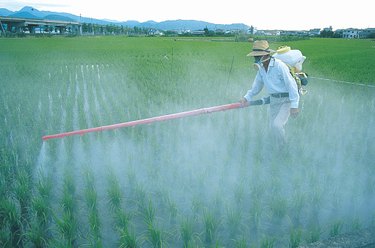
Agricultural chemicals, or "agrochemicals," are any of a series of chemicals engineered to control pests and increase crop yield. Fertilizers, such as ammonia or animal manure, increase yield. Chemicals such as insecticides and herbicides help control the presence of unwanted plants or insects. Many agrochemicals are toxic, and all have an impact on the environment as well as on the crop.
Advantage: Increased Yield
Video of the Day
The primary reason that farmers and gardeners use chemicals is to grow bigger fruits, bigger vegetables or brighter flower blooms. Fertilizing agrochemicals inject much needed nutrient chemicals, such as nitrogren or potassium, directly into the soil to help plants grow. Different types of herbicides kill unnecessary weeds, allowing only the plant of choice to grow without competition for food. Pesticides applied periodically also make the plant poisonous to insects and other creatures that attempt to eat the leaves or fruit.
Video of the Day
Disadvantage: Unsustainable Soil Conditions

Nitrogen is often regarded as a highly effective and cheap fertilizer. However, repeated use of the chemical can cause an imbalance in the pH of the soil, eventually rendering it useless for growth of any kind. This can be mitigated through the application of additional nutrients, which increases the cost, or the rotation of nitrogren-leaching and nitrogren-restoring crops for each growing season. Corn and soybeans are an example of two such complementary crops, which can be rotated to preserve the soil.
Advantage: Cost-Effectiveness
Traditional single-nurtrient agrochemicals, such as anhydrous ammonia, come with small pricetags when compared with naturally-derived alternatives. However, problems with soil imbalances may require the application of different nutrients, bringing the cost in range with some non-chemical options.
Disadvantage: Toxicity and Regulation
Many agrochemicals are highly dangerous to humans and animals in their concentrated forms. For example, ammonia in low concentrations is generally harmless to humans, but high concentrations of the gaseous fertilizer anhydrous ammonia can drift over long distances and prove fatal to human. These fertilizer are often regulated by federal and state entities in their usage and storage, requiring specialized equipment and training. Furthermore, trace amounts of various agrochemicals have been found in the urine samples of children who eat produce grown with these chemicals. Switching these childrens' diets to produce grown without agrochemicals mitigated these levels. It should be noted that the impact these chemicals have on health and development is not entirely clear.
- University of Michigan (PDF): Incorporating resistance in pesticide management: a dynamic regional approach
- University of Illinois: Fertilizer Prices in 2008, 2009, and 2010
- IUPAC: Spray Drift and Its Mitigation
- University of Florida: Agrochemicals and Security
- Michigan State University: Kinds of Fertilizer
- International Union of Pure and Applied Chemistry